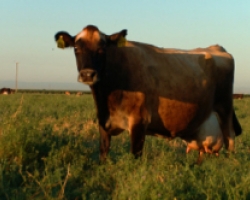
Farmageddon isn’t a pastoral Michael Bay film as the title might suggest, but it is explosive and may provide welcome respite from the recent Transformers bonanza. It’s an eco-documentary by Kristin Canty, a mother who found her way into filmmaking via sheer outrage.
Canty follows several farmers and distributors on the frontlines in a war against raw milk – the stuff people began drinking for more than 8,000 years ago, when someone pulled on a cow udder and found it produced something tasty. Chemist Louis Pasteur originally intended the pasteurization process for keeping wine and beer from souring – the French commitment to their alcohol is amazing. The process was extended to milk and for a long time, pasteurized milk was sold side-by-side with the raw version. However, as the industrial food system took hold, the pasteurization process became necessary, as industrial milk would often make people ill. Pasteurization became the Food and Drug Administration’s failsafe despite the benefits of raw milk, which has more healthy bacteria and has been claimed by some to improve allergies, asthma and digestion.
Are folks rolling the dice with raw milk and its byproducts like yogurt and cheese? Yes. Raw milk can contain bacteria that can make a person sick, even fatally so. But so can spinach, hamburger and fried Twinkies. But raw milk seems to bring out the nasty side of our government – raids, guns and seven-figure surveillance operations. The film is a collection of eyewitness interviews, expert testimony and actual footage, depicting the U.S. Government spending tax dollars to stalk small farmers, raid their farms, confiscate their equipment and sue them in court – rarely with a warrant or cause.
Canty’s film is elegant in its simplicity. It shows the evidence and allows the viewer to ask most of the questions – like why do we punish small co-ops for producing healthy foods and yet subsidize the industrial complex that’s contributing to the nation’s obesity problems. Is it really safer to pasteurize dairy products or is that something we’ve just grown accustomed to, even though it may be detrimental to our health? And wouldn’t Pasteur, a Frenchmen, be rolling in his grave to know that Americans were pasteurizing cheese?
In the film, perennial food documentary-favorite Joel Salatin of Polyface Farms asks, “Why do they have such a problem with freedom?” It’s a rhetorical question, of course, because most people are well aware that the answer is money. Canty tries for straight answers from the FDA and the Department of Agriculture but what no one seems willing to confess is that the heart of the problem lies in the revolving door between politics and agribusiness. Her film is a small victory in a larger battle for the freedom to choose better food. It’s a war that can use all the patriots it can get.
For more information on how to request a local screening of Farmageddon, visit farmageddonmovie.com.
